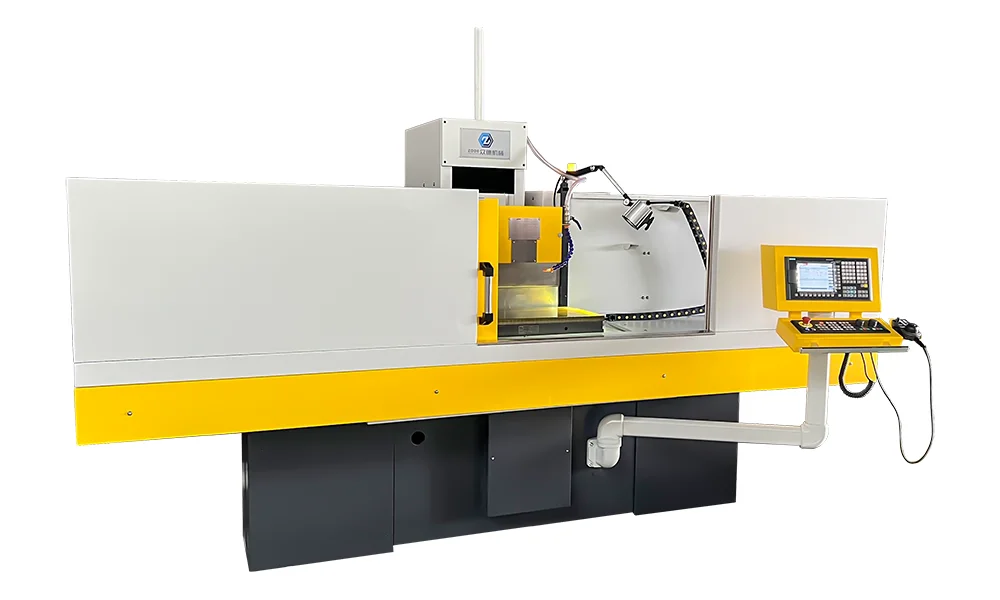- This topic is empty.
-
AuthorPosts
-
2025-09-09 at 4:56 pm #63276
In the evolving landscape of advanced machining, the automatic 3 axis surface grinder has emerged as a cornerstone for precision engineering. This machine tool is designed to perform highly accurate grinding operations across three axes—X, Y, and Z—ensuring consistency, efficiency, and repeatability in surface finishing. From tool rooms to production lines, its ability to produce tight tolerances and smooth finishes has made it indispensable in industries such as aerospace, automotive, electronics, and mold-making. In this blog post, Nantong Zode, a high performance automatic CNC surface grinder supplier, will share the function of automatic 3 axis surface grinder, its advantages, applications, etc.
Understanding the Function of 3 Axis Surface Grinder
At its core, the 3 axis surface grinder is engineered to achieve flat, parallel, and finely finished surfaces. By moving the grinding wheel and workpiece along three independent axes, the machine ensures that material removal occurs with maximum control. The automatic function eliminates manual intervention, reducing operator fatigue while enhancing accuracy.
The X-axis usually controls the longitudinal movement, the Y-axis handles the cross-feed, and the Z-axis governs vertical adjustments. This synchronized control allows the automatic grinder to execute complex grinding tasks with minimal errors.
Advantages of Automatic Grinding Technology
Precision Beyond Manual Capabilities
The automatic 3 axis surface grinder offers superior accuracy compared to manual grinders. Its computer-assisted operation minimizes human error, ensuring consistent quality across batches.
Efficiency and Time Savings
Automation allows continuous operations with reduced downtime. Once programmed, the machine can handle multiple cycles with minimal supervision, improving production throughput.
Enhanced Surface Finish
Industries demand ultra-smooth finishes for components such as molds, dies, and machine parts. The three-axis control provides refined control over grinding depth, enabling mirror-like surface finishes.
Operator Safety and Comfort
Unlike traditional manual grinders, the automatic design reduces direct human contact with grinding tools, enhancing workplace safety. Operators can focus on machine monitoring rather than performing repetitive physical tasks.

Why Choose Automatic 3 Axis Surface Grinder Over Traditional Models
While two-axis or semi-automatic grinders offer basic functionality, the automatic three-axis surface grinder surpasses them in flexibility and performance. The Z-axis automation provides precise vertical adjustments, enabling consistent thickness and parallelism of materials.
Moreover, the integrated software-driven control system makes setup easier, allowing for storage and recall of grinding parameters. This adaptability is crucial for companies working with diverse materials such as hardened steels, ceramics, or composites.
Applications of 3 Axis Automatic Surface Grinding Machine
Aerospace Component Manufacturing
In aerospace, components demand micron-level accuracy. The 3 axis automatic surface grinder ensures tight tolerances for turbine blades, engine parts, and landing gear components.
Mold and Die Industry
Mold-making relies heavily on precision surfaces. With automated three-axis grinding, toolmakers achieve smooth cavity surfaces and accurate mold bases that directly impact product quality.
Automotive Sector
Engine blocks, transmission components, and braking systems require flat and uniform surfaces. The automatic 3 axis grinder ensures durability and performance by eliminating irregularities.
Electronics and Semiconductor Production
For delicate electronic components, flatness and surface finish are critical. Automatic grinders guarantee consistent outcomes for circuit boards, semiconductor wafers, and micro-mechanical parts.
Role of CNC in Automatic 3 Axis Surface Grinders
Modern CNC 3 axis surface grinders elevate automation by integrating computerized numerical control. CNC systems allow operators to program intricate grinding paths, optimize tool wear, and reduce cycle times. With features like digital displays, automatic wheel dressing, and adaptive feed rates, CNC-enhanced machines provide a new dimension of control and reliability.
Key Features to Look for in an Automatic 3 Axis Surface Grinder
-
High-precision spindle systems for smooth rotation and consistent material removal
-
Robust machine bed construction to minimize vibration and ensure stability
-
Digital control panels for intuitive operation and parameter management
-
Automatic lubrication systems to reduce wear and extend machine lifespan
-
Wheel dressing automation for maintaining grinding efficiency and accuracy
How Automatic 3 Axis Surface Grinders Support Industry 4.0
As smart manufacturing evolves, the automatic three-axis surface grinder is becoming part of digital production ecosystems. Machines now feature IoT connectivity, remote monitoring, and predictive maintenance capabilities. These advancements reduce downtime, improve resource efficiency, and align with lean manufacturing principles.
Maintenance and Longevity of 3 Axis Grinding Machines
Proper care is crucial to extend the service life of these machines. Routine inspection of grinding wheels, lubrication systems, and axis alignment ensures reliable performance. Automated grinders, due to their sophisticated design, often come with diagnostic features that alert operators about maintenance needs before breakdowns occur.
Future Trends in Surface Grinding Automation
The future of the automatic 3 axis surface grinder lies in increased AI integration, adaptive control systems, and energy-efficient designs. Hybrid grinding machines that combine additive manufacturing with automated grinding are also on the horizon, offering unparalleled flexibility in component production.
Conclusion
In the modern era of precision manufacturing, the automatic 3 axis surface grinder stands as a vital machine tool. Its capability to deliver unmatched accuracy, repeatability, and efficiency makes it indispensable across industries. Whether used in aerospace, automotive, or mold-making, this advanced grinding technology is not just a tool—it is a strategic investment in quality and competitiveness.
http://www.zodemc.com
Nantong Zode -
-
AuthorPosts
- You must be logged in to reply to this topic.